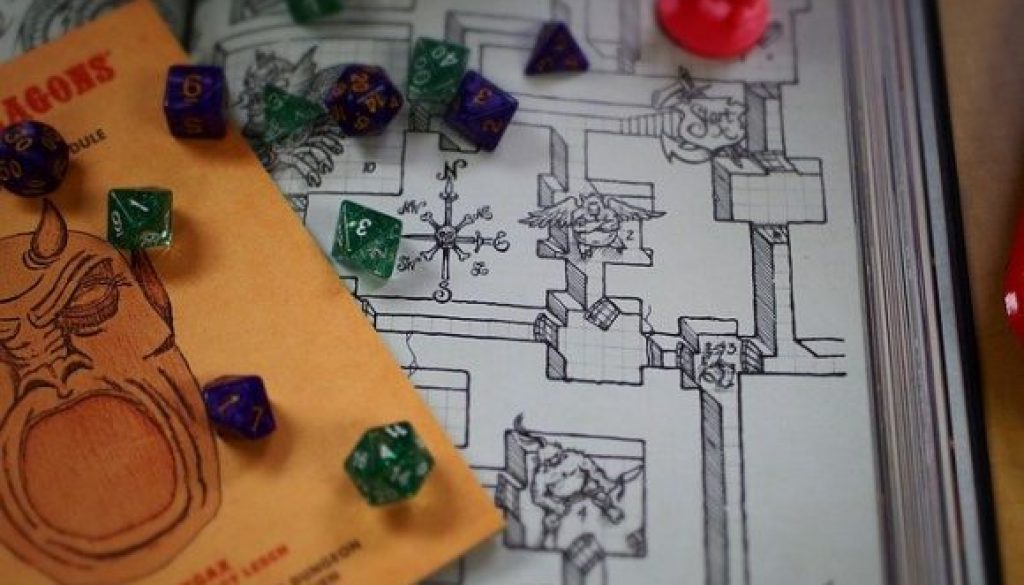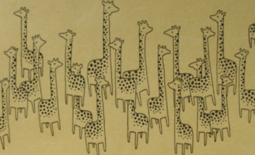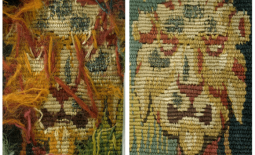Role-Playing Games Increase Creativity
You are a brave warrior armed with sword and shield as you enter the labyrinth in pursuit of the monster terrorizing the local villagers. Descriptions of the best vary, but they are all alike in two respects — lots of long claws and lots of sharp teeth.
Another citizen has gone missing in the night and as you followed the screams like blood-curdling breadcrumbs to the entrance of this stone maze hidden in the dark woods. You draw your sword as you step into a dark corridor, continuing to follow the screams around twists and turns moving you leading you deeper into the labyrinth.
You’re very close to the frightened screams now and you turn the corner expecting to see the abducted girl from the village, but instead find a nest of vicious harpies. These nightmare creatures are the size of a pony and have the lower body of a vulture with feathered legs and long, sharp black talons. Their torso is that of a woman, but with giant wings sprouting from its shoulders instead of arms. The head of the creature appears to be that of a human female, but the hair looks more like tufts of feathers, and instead of having lips its mouth is a short hooked beak. As it opens the beak to emit another blood-curdling scream that you now realize you assumed was frighted cries of the young villager, you can see the inside of the beak is lined with rows and rows of sharp, jagged, saliva-covered teeth.
You’ve wandered into a full nest of the winged monstrosities and are outnumbered six to one. You try to slowly back away to retrace your steps and take another path in the labyrinth, but as you turn your boot crunches on the bones of previous harpy prey littering the cavern and you hear the flapping of heavy wings and the cries of alert from the monsters. You’ve been spotted…
Will you run and try to escape as you search for the captive villager, or will you stand and fight these beasts in order to save another traveler from finding their way into their clutches?
As a kid I loved the role-playing game of Dungeons & Dragons.
The player’s guide, packaged adventures, Dungeon Master guide, and Monster Manual were filled with stories and illustrations that allowed me to become part of an imaginary adventure similar to those in the books of myths and legends I enjoyed reading. I’d spend hours drawing up the characters who strengths and traits I randomly rolled using amazing multi-sided dice that were nothing like the ones I rolled in games like Monopoly or Parcheesi. I’d use graph paper to map out the dungeons I’d explore and sketching the monsters (and magical weapons and treasure) I’d find within.
Role-playing games like Dungeons and Dragons, and the White Wolf Publishing games that came after (Vampire: The Masquerade, Werewolf: The Apocalypse, etc.) all fostered a creativity within me that made me a better storyteller, a better team player, a more adept problem solver, and actually increased my empathy for others — and I think it does the same for anyone who chooses to dive into these kinds of games.
Better Storytelling
 Tabletop role-playing games had plenty of items that could increase your enjoyment and immersion in the game; reference books, maps, character miniatures, models of buildings and castles, and plenty of options for the dice you needed to roll in order to determine whether your strengths could overcome those of your opponents — but the only real requirement was your imagination.
Tabletop role-playing games had plenty of items that could increase your enjoyment and immersion in the game; reference books, maps, character miniatures, models of buildings and castles, and plenty of options for the dice you needed to roll in order to determine whether your strengths could overcome those of your opponents — but the only real requirement was your imagination.
When I took my turn as the Dungeon Master (the storyteller, narrator, and game referee), I’d frequently throw the proverbial rule book out the window in favor of making sure the story was exciting, the monsters were scary, and the adventurers (the players) had a great time and were well rewarded in the game for their heroic efforts.
If they had to roll a 15 to kill the monster, but rolled a 1 (which meant the creature had killed the player instead), there was always another chance or miraculous save the rescued them in the nick of time, because simply put — dying in the game would have sucked but escaping by the skin of their teeth to fight another day was way more fun. Playing the game made me a better storyteller.
Being a good Teammate
D&D games frequently consisted of 3-5 other players. You adventured as a group in order to survive the dangers of the game. You played as your characters who frequently had personalities that didn’t align with your own real-life persona …that was part of the fun. In any group of strong characters (real or imaginary) there is conflict. Not every character will get along with another. There was a fine balance of wanting to be the player who killed every monster and allowing other teammates to have their talents shine as well (along with the occasional disagreement about who should get the coolest finds in the haul of treasure).
As a D&D player you experienced playing in a group with the wants and needs and motivations of others. I am certain that dealing with the wizards, rogues, and barbarians in my board games made me better able to negotiate and tolerate the web designers, salespeople, and managers in the boardroom later in life.
Becoming a Problem Solver
Every moment in every game there were choices to make a problems to solve. Di you accept the quest from the strange old woman your group met in the tavern? Did you charge blindly into dungeon room where you heard cries for help? How could you extricate yourself from the goblin’s prison without alerting the entire horde to your escape? As a player you always knew there was at least one way out of your predicament. You knew a solution was available — you just had to find it.
Solving puzzles and riddles, making deductions based on your listening and observation skills were always part of the game. Just as I’ve found them to be a part of my daily adult life (at home and at work).
Behaving with Empathy
When playing a character in D&D (and sometimes several characters because someone has to play all the extras in the village, the evil wizards, conniving dragons, and an entire cast of people in need of help), you learn to not just put yourself in the shoes of another person, but to also behave and speak and feel like that other person. Role-playing is basically acting, and all the great actors of stage and screen have agreed that to realistically portray a character the actor needs to feel what the character feels and to be able to identify with their circumstances.
Playing the role of a character and acting out their personality and motives in the game, made me better at understanding and identifying the needs, emotions, and motives of the customers I serve, the co-workers in the office, and even my friends and neighbors.
Think about your favorite games and the creative lessons you learned while playing them.
You may have learned patience and strategy by playing chess, or honed your math skills by playing Monopoly, or sharpened your skills of observation and deduction by playing Clue, or increased your vocabulary by playing Scrabble.



